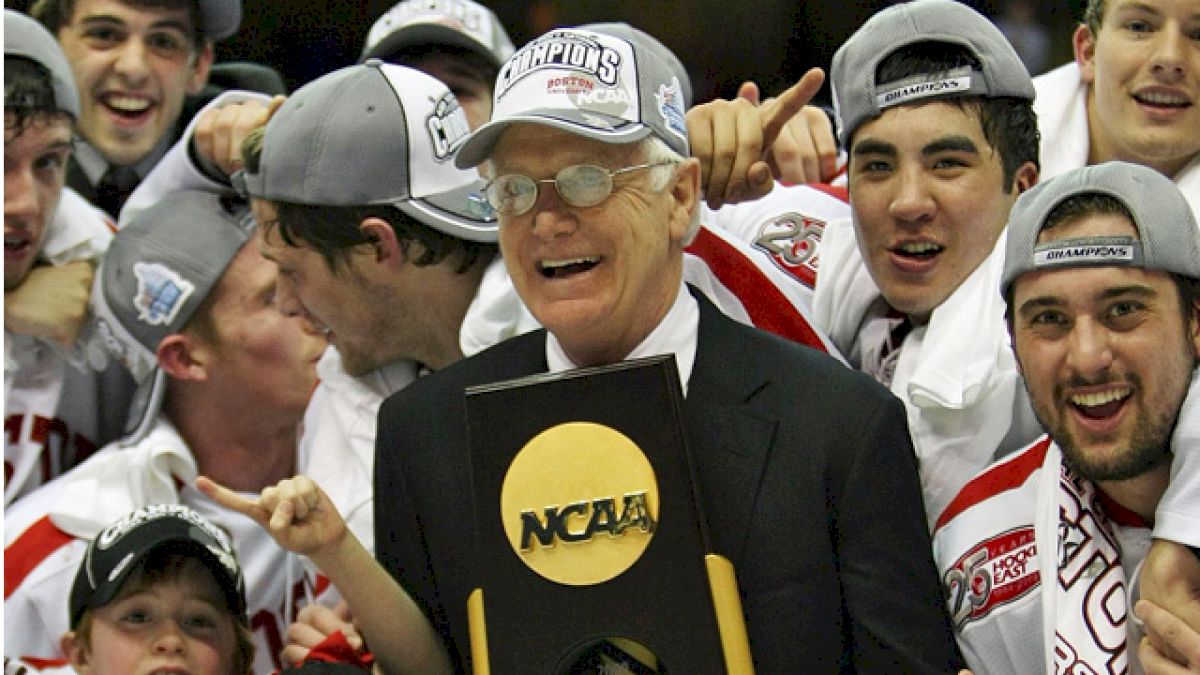Jack Parker On NCAA Hockey's New World Order
Jack Parker On NCAA Hockey's New World Order
Former BU hockey head coach Jack Parker shares his opinions of how teenage superstars with NHL aspirations have changed the landscape of college hockey.

When it comes to eastern college hockey, Jack Parker belongs on Mount Rushmore. Three national titles, 13 Frozen Fours, and 897 wins, all as head coach of Boston University.
He is often described as “the smartest guy in the room” at every college hockey convention he attends. When he left BU in 2013, he had a recruit in the pipeline from the NTDP named Jack Eichel. Since then, BU has had mixed success with their abundance of players from USA Hockey’s program.
Parker did not hesitate to share his opinions of how teenage superstars with NHL aspirations have changed the landscape of American college hockey. He spoke with FloHockey’s Tim Rappleye about his concerns.
FloHockey: Coach, college hockey’s biggest programs, BU included, have started a trend of depending on one-and-done teenagers to lead their teams. How do you think this is working out?
Jack Parker: The problem is, they come in as hotshot freshmen, but they come into a league that’s full of 24-year-olds. A lot of them don’t have the success they expect to have, and they get frustrated. They don’t see that this is part of the process, you got to get from A to C by going through B.
They almost use it as, “check that box off—played college hockey. Check that box off—played in the Beanpot.” But they’re not really gung ho for BC or BU or Michigan there, they’re gung ho for their careers. That coupled with the fact that every freshman year they’re worried about making the World Juniors; their performance in the World Juniors is just as important to them as their performance in any college games, if not more important.
They’ve got an awful lot of things on their mind as freshmen, and their biggest battle is that they’re playing against older guys. They’re not playing Major Junior hockey. Some of them think, “I got to get out of here because I’m losing my confidence,” or “This league isn’t good for me.” Others think, “I’m all set because I’ve done everything I can in this league, so time to move on.” The worst thing is that a lot of them have one foot out the door before they put their college uniform on. They are not “all in” so to speak.
They listen to a whole bunch of different voices than kids that were superstars coming in when they were 18 in the 80s and 90s. They didn’t listen to as many voices as these kids are. That’s all tough for them to handle. Add to the fact that most of these kids aren’t going to stay for more than two years.
But can anyone say no to this kind of talent?
You’re not going to say, “This is a bad thing, I’m going to pass up on Jack Eichel.” You’d be insane not to take Jack Eichel. But a lot of those guys aren’t Jack Eichel. A lot of those guys aren’t Charlie MacAvoy. They’re good players, but they aren’t overwhelmingly successful their freshman year. That causes problems with the team, the coach, the player, and the parents. “We thought it was going to be easier, we thought it was going to be better.” There’s a whole bunch of things running through that kid’s mind, and it’s very difficult on him.
We just had a reunion of the 2009 [national championship] team, and we had guys that played in The Program, like Colin Wilson and [Kevin] Shattenkirk. We also had older guys, I think we had eight guys in the senior class. They all played and they were all very important to the team. I think that’s what’s missing.
BU, the last few years, they get a lot of these guys that never get to be seniors. Every year, BU has a senior class of two kids [laughs]. All the hotshots are gone by then, and what happens is that you fill them up with more hotshots. But they’re 18, they’re not 22. The usual “brand name” college hockey teams didn’t make the national tournament because they had an awful lot of these type guys. Those type of guys can’t win it for them their freshman year, and they’re not around much longer.
That’s what changed the game’s balance of power. It’s tough for the schools that can get that kid from The Program, the top-notch draft pick, he’ll be leaving in a year or two. The NHL teams feel they have to sign the kid by the time he’s a junior, “Maybe we should sign him by his sophomore year because if we don’t sign him by the time he’s a junior he might stick around and become a free agent, and we get nothing out of that draft pick.”
It’s a difficult situation for the coaches, the players, and the NHL. There’s a whole bunch of things going that in the 90s and early 2000s you didn’t have to deal with.